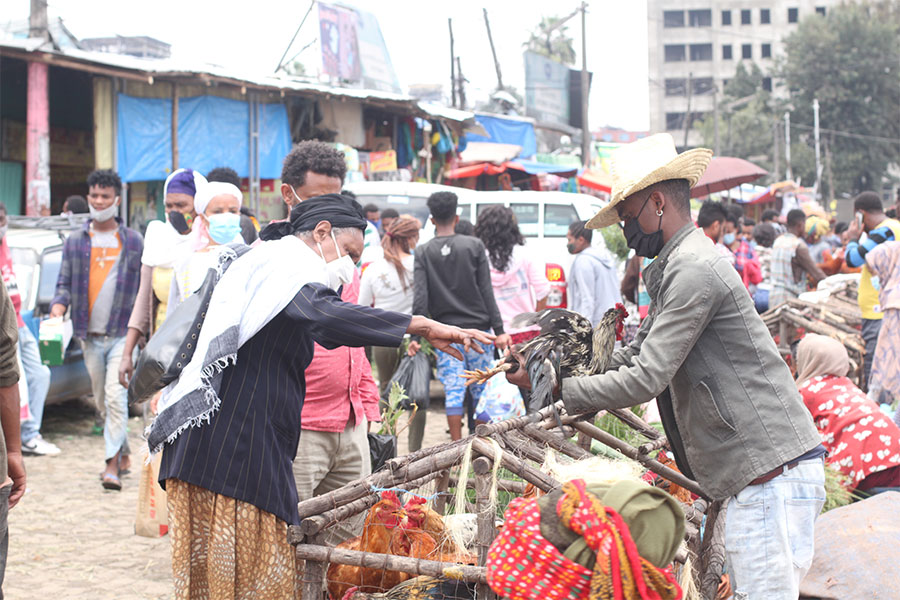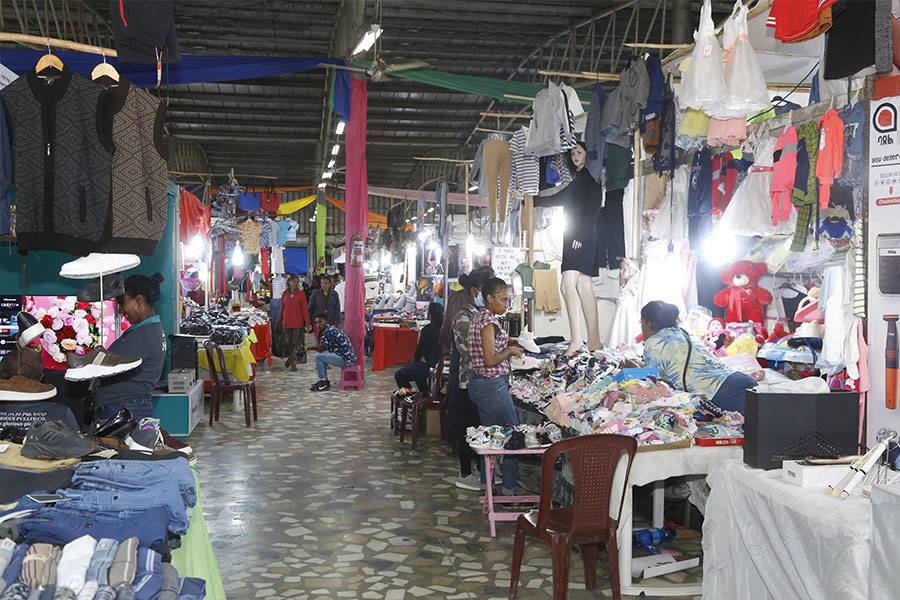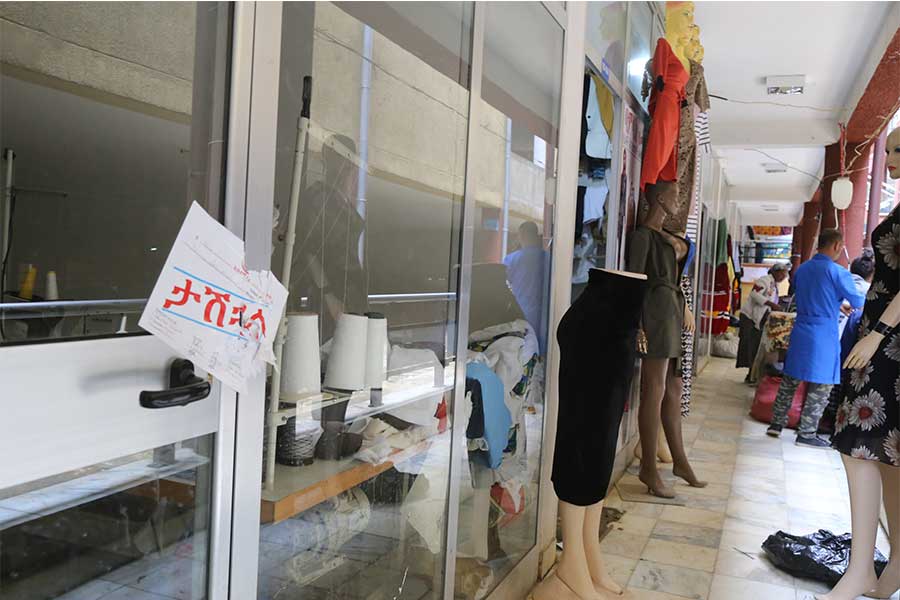
Fortune News | Feb 06,2021
Dec 24 , 2022
By Abraham Tekle
The International Monetary Fund (IMF) estimated that Ethiopia’s GDP grew by two percent last year, which used to be between six and 10pc in the preceding five years.
The value of the Birr has also fallen rapidly since 2017, while inflation remains at double digits despite policy measures taken by the Administration of Prime Minister Abiy Ahmed (PhD). Cooking oil, beverages, bread and cereal prices have dramatically risen. The war between Russia and Ukraine significantly aggravates these markets as they are the major suppliers of wheat, crude and refined cooking oils, and agricultural inputs.
One risk of higher inflation is that it has a regressive effect on lower-income families and older vulnerable living on a fixed income. As prices rise faster than wages, there will be a steep decline in real incomes, putting pressure on institutions that can grow to political instability and social unrest. The recent strike by university teachers could be considered a reflection to reckon with.
Inflation is one of the significant macroeconomic challenges facing Ethiopia’s economy. While the country recorded double-digit average growth rates until 2017, inflation averaged 15pc in the 17 years beginning 2003.
Data from the Central Statistics Service (CSS) indicate that the headline inflation in February this year slightly decreased by one percentage point to 33pc from the month before, while food inflation increased by one percentage point to 41.9pc. In November, inflation had reached 35.1pc, showing a four percentage point increase from the previous month. The price of food items increased, making it difficult for many to carry the burden.
The rising food inflation is resulting in severe food access constraints for low-income and vulnerable households.
Inflation intensifies the problem of poverty and becomes challenging for people in the lower-income groups already living hand-to-mouth. According to the World Bank report in 2020, the national poverty rate declined amid challenging climatic conditions, with recommendations on areas that need profound attention.
Borgen Project is a United States-based organisation monitoring and fighting global poverty. It praised Ethiopia for halving the poverty rate in 15 years, from 44pc in 2000.
“An estimated four Ethiopians escape poverty every minute,” it reported. “Infrastructure developments and continued growth in the agriculture and service sectors helped bolster the nation’s economy and improve living conditions for its people.”
These appear to be generational gains in retreat.
With the pandemic and the civil war in the north, low economic growth has become an additional burden in the past three years, decelerating the figure each year.
The lack of access to capital significantly contributes to poverty traps. Among the economic challenges are unemployment, slow economic growth, debt burden, the balance of payment deficits, steady depreciation of the national currency, and low foreign exchange reserves. The federal government’s increased spending over the two-year war, low agricultural production, and supply chain disruptions induced by the pandemic have pushed the bar high.
Unemployment does not make a drastic change with slight inflationary changes. However, a significant fluctuation could lead to theft, corruption, embezzlement, and money laundering to survive. These recognise the economic, unemployment and social damage that high and volatile inflation can bring.
The costs of unemployment are apparent when viewed from an economic perspective. Its social costs are challenging to measure, leading to broader social unrest. It is essential to increase the productivity of the agriculture and industrial sectors to create job opportunities.
Extravagant spending on projects needs to be reduced while enhancing the productivity of the domestic economy vital. Applying a firm monetary policy helps to create stable economic growth. It is also essential to control the money circulation not to aggravate the already skyrocketing commodity prices. The long-lasting adverse effects will become stubborn if the inflation persists.
PUBLISHED ON
Dec 24,2022 [ VOL
23 , NO
1182]


Fortune News | Feb 06,2021


Agenda | Sep 11,2020

Commentaries | Aug 12,2023

Fortune News | Nov 24,2024

My Opinion | Feb 19,2022

Commentaries | Sep 10,2021

Fortune News | Jun 07,2020

Agenda | Apr 16,2022

Featured | Sep 28,2019

My Opinion | 132038 Views | Aug 14,2021

My Opinion | 128435 Views | Aug 21,2021

My Opinion | 126362 Views | Sep 10,2021

My Opinion | 123981 Views | Aug 07,2021





Dec 22 , 2024 . By TIZITA SHEWAFERAW
Charged with transforming colossal state-owned enterprises into modern and competitiv...

Aug 18 , 2024 . By AKSAH ITALO
Although predictable Yonas Zerihun's job in the ride-hailing service is not immune to...

Jul 28 , 2024 . By TIZITA SHEWAFERAW
Unhabitual, perhaps too many, Samuel Gebreyohannes, 38, used to occasionally enjoy a couple of beers at breakfast. However, he recently swit...

Jul 13 , 2024 . By AKSAH ITALO
Investors who rely on tractors, trucks, and field vehicles for commuting, transporting commodities, and f...

Jul 12 , 2025
Political leaders and their policy advisors often promise great leaps forward, yet th...

Jul 5 , 2025
Six years ago, Ethiopia was the darling of international liberal commentators. A year...

Jun 28 , 2025
Meseret Damtie, the assertive auditor general, has never been shy about naming names...

Jun 21 , 2025
A well-worn adage says, “Budget is not destiny, but it is direction.” Examining t...

Jul 13 , 2025 . By YITBAREK GETACHEW
The Addis Abeba City Revenue Bureau has introduced a new directive set to reshape how...

Jul 13 , 2025 . By BEZAWIT HULUAGER
Addis Abeba has approved a record 350 billion Br budget for the 2025/26 fiscal year,...

Jul 13 , 2025 . By RUTH BERHANU
The Addis Abeba Revenue Bureau has scrapped a value-added tax (VAT) on unprocessed ve...

Jul 13 , 2025 . By NAHOM AYELE
Federal lawmakers have finally brought closure to a protracted and contentious tax de...